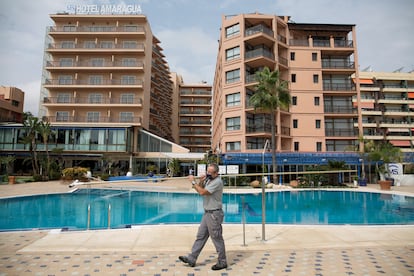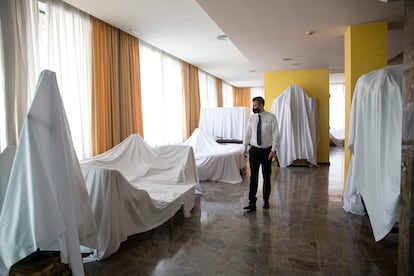Waiting for tourists in southern Spain’s ghost coast
More than 80% of hotels on the Málaga beachfront have closed while Cádiz’s are surviving on 20% occupancy

Sheets cover the lobby furniture and a deadly silence pervades the empty restaurant of the Hotel Amaragua. Outside, someone is removing the leaves that have fallen into the enormous swimming pool that is bereft of bathers, while the usual sun loungers have been stacked.
The deserted facilities at the hotel, which is one of the biggest in Torremolinos, a popular resort in Spain’s Málaga province, bring to mind scenes from a horror movie. But this is not fiction; it’s a reality in which around 80% of the Costa del Sol’s hotels have closed their doors, without knowing when they might reopen.
“It’s horrific!” says Miguel Sánchez, founder of the MS hotel chain that owns the Amaragua. In 2019, they had 603 guests here at this time of the year. Today, as they close for the first time in 25 years, they have none. Like so many others, it has become a ghost hotel.
This summer has been disastrous, horrible, enough to make you cryÁlvaro Reyes, Hotel Alay commercial director
The scenario is the opposite of the bumper year that had been expected on the Costa del Sol. According to Málaga provincial authorities, in 2019 the hotel industry had a combined direct and indirect turnover of €14.4 billion and generated 180,000 jobs. Over the last 10 years, each year has been better than the last, but 2020 has dramatically reversed the trajectory.
“This summer has been disastrous, horrible, enough to make you cry,” says Álvaro Reyes, commercial director of the Alay, a flagship hotel in Benalmádena, which was able to open partially during August. First there was the devastating impact of the three-month coronavirus lockdown, and then the worst summer season in living memory. The average occupancy rates for the establishments that did open were around 35% in July and 40% in August. Most have now closed.
The beaches along the Costa del Sol are now deserted. By mid-September, beach-bar barbecues were off the agenda, lifeguards were hanging around their huts and the promenades looked as though they had gone back into lockdown. “It doesn’t even look this empty in winter,” says Reyes.

Today, the collapse of the travel giant Thomas Cook and even Brexit seem like minor hiccups compared to the quarantine restrictions and the advisories issued by the British – then the Germans, Belgians and Dutch – to avoid any travel to Spain. “Not many people live here permanently and, without the tourists, there’s hardly anyone around anymore,” says Juan Rueda, who for the last 33 years has run a supermarket next to the Amaragua Hotel. The health crisis forced him to dismiss his only employee, who has found agricultural work in France. “It’s a knock-on effect and now we’ve all felt it,” he says, preparing a sandwich for one of his few customers.
The knock-on effect means that, besides hotels, the entire tourist ecosystem, including beach bars, ice cream parlors, car rentals and souvenir shops, is teetering on the edge of disaster. The Málaga province hospitality association, for example, estimates that there will be around 5,000 layoffs over the next few months around Málaga. “The tourist sector on the Costa del Sol is very dependent on international tourism, and it’s paying the price for that,” explains a source from the association, who says that the situation is being exacerbated by the fact that domestic trips organized by the Spanish authorities for the elderly have also been cancelled.
Besides hotels, the entire tourist eco-system, including beach bars, ice cream parlors, car rentals and souvenir shops, is teetering on the edge of disaster
Meanwhile, in nearby Cádiz province, which has around 2,600 hotel beds, average occupancy for July and August stood at 60% due to the region’s popularity with national tourists. “The data is acceptable given the current situation,” says Stefan De Clerck, director of Hace Hoteles and president of the Cádiz Hotels Provincial Association. “Though if we were to compare it with 2019, it is, of course, a disaster. Cádiz and Huelva are the coastal regions that have done best in Andalusia this summer.”
Despite these figures, the next few weeks are not looking good. “Predicted occupancy for the entire month of September is 20% to 25% compared to 90% in other years. The situation is frankly bad,” adds De Clerck, who has temporarily closed his Duque de Nájera Hotel for the first time since it opened in 1996. “It has been very hard for us.”
Now, De Clerck and his staff, like thousands of others, are looking forward to the spring of 2021 with hopes of a more normal season. Of course, that will depend on how the health crisis evolves. “At least we know that people want to come,” says Reyes from the Alay Hotel, which receives many calls from Scandinavian customers assuring them that they will be back. “We’ll be here waiting for them!”
English version by Heather Galloway.
Tu suscripción se está usando en otro dispositivo
¿Quieres añadir otro usuario a tu suscripción?
Si continúas leyendo en este dispositivo, no se podrá leer en el otro.
FlechaTu suscripción se está usando en otro dispositivo y solo puedes acceder a EL PAÍS desde un dispositivo a la vez.
Si quieres compartir tu cuenta, cambia tu suscripción a la modalidad Premium, así podrás añadir otro usuario. Cada uno accederá con su propia cuenta de email, lo que os permitirá personalizar vuestra experiencia en EL PAÍS.
¿Tienes una suscripción de empresa? Accede aquí para contratar más cuentas.
En el caso de no saber quién está usando tu cuenta, te recomendamos cambiar tu contraseña aquí.
Si decides continuar compartiendo tu cuenta, este mensaje se mostrará en tu dispositivo y en el de la otra persona que está usando tu cuenta de forma indefinida, afectando a tu experiencia de lectura. Puedes consultar aquí los términos y condiciones de la suscripción digital.








































